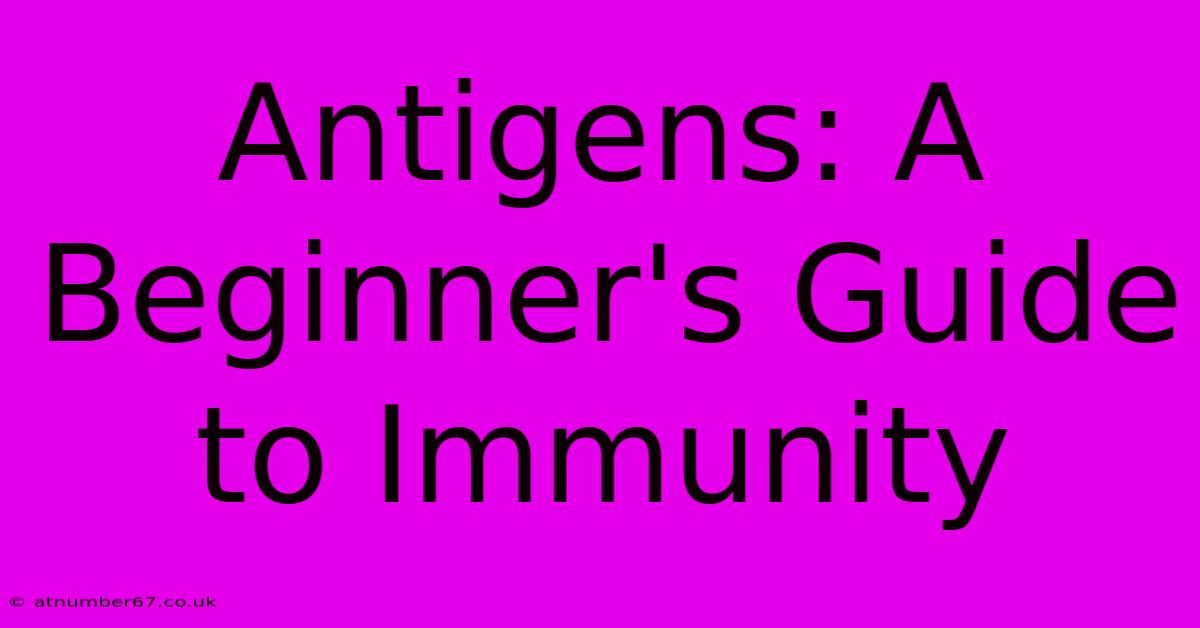Antigens: A Beginner's Guide To Immunity

Table of Contents
Antigens: A Beginner's Guide to Immunity
Understanding how our bodies fight off infection is crucial to appreciating the power of our immune system. At the heart of this system lies the concept of antigens. This beginner's guide will break down what antigens are, how they work, and their role in building immunity.
What are Antigens?
Simply put, an antigen is anything that can trigger an immune response. These are usually foreign substances that invade the body, but they can also be molecules produced by the body itself, in cases of autoimmune disease. Think of antigens as "invaders" that your immune system recognizes and fights against. These invaders can be:
- Bacteria: Microscopic organisms that can cause various infections.
- Viruses: Even smaller than bacteria, viruses need to invade cells to reproduce.
- Fungi: Another type of microorganism, some fungi can cause infections.
- Parasites: Organisms that live off a host, often causing harm.
- Toxins: Poisonous substances produced by bacteria, fungi, or other sources.
- Pollen: While not infectious, pollen can trigger an allergic reaction, acting as an antigen.
- Transplanted organs/tissues: The body may recognize these as foreign and trigger rejection, making them act as antigens.
How the Immune System Recognizes Antigens
Each antigen possesses unique molecular structures, like a fingerprint. These structures are called epitopes, and it's these specific epitopes that the immune system recognizes. Specialized cells within the immune system, such as B cells and T cells, have receptors that can bind to these epitopes. This binding event is the crucial first step in initiating an immune response.
The Immune Response: How the Body Fights Back
Once an antigen is recognized, the immune system springs into action. This response usually involves several key players:
- B cells: These produce antibodies, which are Y-shaped proteins that bind to specific epitogens on antigens, neutralizing them or marking them for destruction by other immune cells.
- T cells: There are different types of T cells, each with a specific role. Helper T cells coordinate the immune response, while cytotoxic T cells directly kill infected cells.
- Macrophages and other phagocytes: These cells engulf and destroy antigens through a process called phagocytosis.
Types of Immunity
Our immune system can develop immunity in two main ways:
-
Innate Immunity: This is the body's immediate, non-specific defense mechanism. It includes physical barriers like skin, chemical barriers like stomach acid, and cellular components like phagocytes. Innate immunity is always "on" and provides a first line of defense.
-
Adaptive Immunity: This is a more specific and targeted response that develops over time. It involves B cells and T cells recognizing specific antigens, leading to the production of antibodies and the development of immunological memory. This allows the body to respond faster and more effectively upon subsequent exposure to the same antigen. This is the basis of vaccination.
Antigens and Vaccines
Vaccines work by introducing a weakened or inactive form of an antigen into the body. This allows the immune system to safely "practice" fighting off the antigen without causing actual illness. This process generates immunological memory, so the body can mount a quicker and stronger response if it encounters the real antigen in the future.
Key Takeaways:
- Antigens are substances that trigger an immune response.
- The immune system recognizes antigens through specific epitopes.
- B cells produce antibodies, while T cells directly kill infected cells or coordinate the immune response.
- Immunity can be innate (non-specific) or adaptive (specific).
- Vaccines utilize antigens to induce protective immunity.
Understanding antigens is fundamental to grasping how our immune system works and how we can protect ourselves from disease. While this is a simplified overview, hopefully, this guide provides a solid foundation for further exploration of this fascinating field.

Thank you for visiting our website wich cover about Antigens: A Beginner's Guide To Immunity. We hope the information provided has been useful to you. Feel free to contact us if you have any questions or need further assistance. See you next time and dont miss to bookmark.
Featured Posts
-
Rohit Sharmas Daughter A Role Model For The Future
Apr 03, 2025
-
Father And Son Crossword Learn Something New
Apr 03, 2025
-
Elon Musks 2024 Net Worth The Rise And Fall
Apr 03, 2025
-
Learn Spanish On Your Own The Power Of Self Study With Trabalenguas
Apr 03, 2025
-
Daughter In Hindi Its Impact On Social Relationships
Apr 03, 2025
